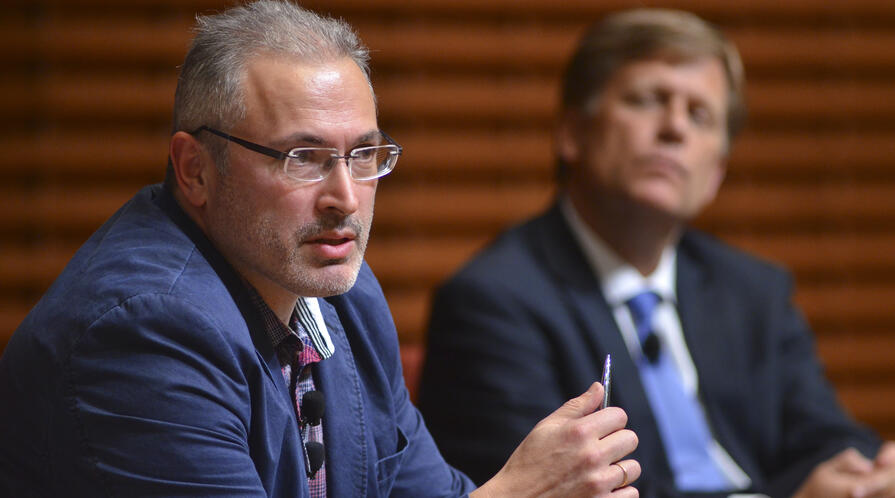At Stanford, dissident describes Russia at crossroads

Mikhail Khodorkovsky, one of Russia’s most visible opposition figures, blasted the current regime and expressed his vision and hope for a new “open Russia” during a visit to Stanford during his first appearance at an American university since his release from prison in 2013.
“Russia is not going to be able to avoid this transition period,” said Khodorkovsky, a former political prisoner of Vladimir Putin’s regime who is now living in exile in Switzerland. “And the task of this transition period is to hold fair elections.”
President Putin has created a war – not economic growth, he said. And Russia is paying for the loss of freedom inside the country and the destruction of democratic institutions with the lives of soldiers and volunteers dying in Ukraine. Even economists loyal to the Kremlin are predicting no growth for the next 10 years, he said, speaking through an interpreter.
“I’m quite confident that if there were honest elections in Russia today, then the people who would come to power would be far more left-leaning than I am,” he said. “The people in power now are intentionally dragging the people back into the Middle Ages.”
 Mikhail Khodorkovsky's talk entitled “Russia: Back to the Future” called upon members of the Russian diaspora to help reshape their country’s future.
Mikhail Khodorkovsky's talk entitled “Russia: Back to the Future” called upon members of the Russian diaspora to help reshape their country’s future.
Khodorkovsky addressed a crowd of about 600 people during an April 13 event hosted by the Freeman Spogli Institute for International Studies and its Center on Democracy, Development, and the Rule of Law. The Russian oil magnate had funded opposition parties before his arrest in 2003. Many, including FSI Director Michael McFaul, believed Khodorkovsky’s conviction and 10-year imprisonment for tax evasion and money-laundering charges were politically motivated.
McFaul, who served as the U.S. ambassador to Russia between 2012 and 2014, recalled how the Obama administration debated theories on why Khodorkovsky was released after a presidential pardon in December 2013.
“One theory is that Putin was ready to release you because he thought you would come out a broken man,” McFaul said. “And we have witnessed today that that theory was incorrect.”
Khodorkovsky told the Stanford audience “the regime will fall as the result of internal problems and civil disobedience.”
The nation’s economic problems stemming from “capital flight, brain drain and a decline in entrepreneurial activity” will deepen, he said, and “people will gradually realize that the only thing conformism will lead to is un-freedom, poverty, and loss of self-dignity.”
Khodorkovsky launched Open Russia, a civil society movement, in 2014 following his prison release. Its goal, he said, is to help establish a democratic structure of power in Russia.
[[{"fid":"218664","view_mode":"crop_870xauto","fields":{"format":"crop_870xauto","field_file_image_description[und][0][value]":"Members of the audience were primarily drawn from the Bay Area community and part of the Russian diaspora. A lively question and answer session followed the event. (Rod Searcey)","field_file_image_alt_text[und][0][value]":false,"field_file_image_title_text[und][0][value]":false,"field_credit[und][0][value]":"Rod Searcey","field_caption[und][0][value]":"Members of the audience were primarily drawn from the Bay Area community and part of the Russian diaspora. A lively question and answer session followed the event. ","field_related_image_aspect[und][0][value]":"","thumbnails":"crop_870xauto","pp_lightbox":"","pp_description":""},"type":"media","field_deltas":{"2":{"format":"crop_870xauto","field_file_image_description[und][0][value]":"Members of the audience were primarily drawn from the Bay Area community and part of the Russian diaspora. A lively question and answer session followed the event. (Rod Searcey)","field_file_image_alt_text[und][0][value]":false,"field_file_image_title_text[und][0][value]":false,"field_credit[und][0][value]":"Rod Searcey","field_caption[und][0][value]":"Members of the audience were primarily drawn from the Bay Area community and part of the Russian diaspora. A lively question and answer session followed the event. ","field_related_image_aspect[und][0][value]":"","thumbnails":"crop_870xauto","pp_lightbox":"","pp_description":""}},"link_text":null,"attributes":{"height":"1314","width":"870","style":"margin-right: 15px; line-height: 20.0063037872314px; width: 300px; float: left; height: 378px;","class":"media-element file-crop-870xauto","data-delta":"2"}}]]
The opposition movement has struggled in its campaign, however, against a nationalistic fervor following the annexation of Ukraine’s semiautonomous Crimean region last year.
“We often hear that the opposition in Russia doesn’t stand a chance, that this is just an impossible dream,” Khodorkovsky said. “But I bring to your attention that the entire history of humanity was based entirely on this type of dream,” he said, citing Thomas Jefferson and Martin Luther King.
“The Russia we dream of seeing is completely different,” he said. “It’s a country of clean streets; of successful, smiling, self-confident people; people who have a job they love and who don’t have to struggle for existence day in and day out.”
“It’s a country where, if you obey the law, you need not be afraid of anybody — not a prosecutor, not a judge, not the governor, not the president. Not even the president of Chechnya,” he continued, drawing claps from the audience.
Khodorkovsky’s vision is for Russia to have an independent judiciary and an influential parliament.
In a nod to Stanford and Silicon Valley, Khodorkovsky said that with a regime change, Russia would need to quickly bring the country out from isolation with the help of people, capital and technologies.
“This is the reason why I’m here. You are the leaders of today’s technological world,” he said. “Much of what has already changed our life and will continue to change it going forward is being created right here.”
“We in Russia believe you aren’t going to start helping our authoritarian regime suffocate the opposition,” he added. “You’re not going to start passing them information and technologies that help record our conversations in the net, break into correspondence, or set up barriers.”
“On the contrary, you are going to help us to bring people the truth, to self-organize on top of the established prohibitions.”
May Wong is a freelance writer.
Photos by Rod Searcey.
The transcript of Khodorkovsky's address is available here in English and Russian.
Facebook Album
On April 13, Mikhail Khodorkovsky addressed a crowd of over 550 at an event hosted by Stanford’s Center on Democracy,...
Posted by Stanford Center on Democracy, Development, and the Rule of Law (CDDRL) on Tuesday, April 14, 2015
